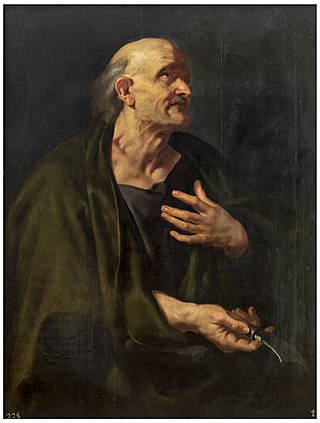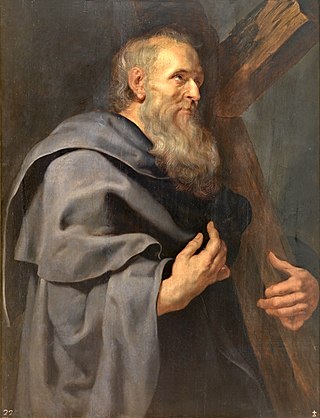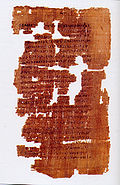
Barnabas, born Joseph (Ἰωσήφ) or Joses (Ἰωσής), was according to tradition an early Christian, one of the prominent Christian disciples in Jerusalem. According to Acts 4:36, Barnabas was a Cypriot Jew. Named an apostle in Acts 14:14, he and Paul the Apostle undertook missionary journeys together and defended Gentile converts against the Judaizers. They traveled together making more converts, and participated in the Council of Jerusalem. Barnabas and Paul successfully evangelized among the "God-fearing" Gentiles who attended synagogues in various Hellenized cities of Anatolia.

John the Evangelist is the name traditionally given to the author of the Gospel of John. Christians have traditionally identified him with John the Apostle, John of Patmos, and John the Presbyter, although this has been disputed by most modern scholars.

Luke the Evangelist is one of the Four Evangelists—the four traditionally ascribed authors of the canonical gospels. The Early Church Fathers ascribed to him authorship of both the Gospel of Luke and the Acts of the Apostles. Prominent figures in early Christianity such as Jerome and Eusebius later reaffirmed his authorship, although a lack of conclusive evidence as to the identity of the author of the works has led to discussion in scholarly circles, both secular and religious.

John the Apostle, also known as Saint John the Beloved and, in Eastern Orthodox Christianity, Saint John the Theologian, was one of the Twelve Apostles of Jesus according to the New Testament. Generally listed as the youngest apostle, he was the son of Zebedee and Salome. His brother James was another of the Twelve Apostles. The Church Fathers identify him as John the Evangelist, John of Patmos, John the Elder, and the Beloved Disciple, and testify that he outlived the remaining apostles and was the only one to die of natural causes, although modern scholars are divided on the veracity of these claims.

Bartholomew was one of the twelve apostles of Jesus according to the New Testament. Most scholars today identify Bartholomew as Nathanael or Nathaniel, who appears in the Gospel of John.

Geʽez is an ancient South Semitic language. The language originates from what is now northern Ethiopia and Eritrea.

Philip the Apostle was one of the Twelve Apostles of Jesus according to the New Testament. Later Christian traditions describe Philip as the apostle who preached in Greece, Syria, and Asia-Minor.

James the Great was one of the Twelve Apostles of Jesus. According to the New Testament, he was the second of the apostles to die, and the first to be martyred. Saint James is the patron saint of Spain and, according to tradition, his remains are held in Santiago de Compostela in Galicia.
An apostolic see is an episcopal see whose foundation is attributed to one or more of the apostles of Jesus or to one of their close associates. In Catholicism, the phrase "The Apostolic See" when capitalized refers specifically to the See of Rome.

The Apocalypse of Peter, also called the Revelation of Peter, is an early Christian text of the 2nd century and a work of apocalyptic literature. It is not included in the standard canon of the New Testament, but is classed as part of New Testament apocrypha. The Apocalypse of Peter is mentioned in the Muratorian fragment, a 2nd-century list of books thought to be canonical in Christianity. The Muratorian fragment expresses some hesitation on the work, saying that some authorities would not have it read in church. The text is extant in two incomplete versions based on a lost Koine Greek original: an edited Greek version and an Ethiopic version, which diverge considerably. It is influenced by both Jewish apocalyptic literature and Hellenistic philosophy from Greek culture. The Apocalypse of Peter is the earliest-written extant document depicting a Christian version of heaven and hell in detail.

In Christian tradition, the Four Evangelists are Matthew, Mark, Luke, and John, the authors attributed with the creation of the four canonical Gospel accounts. In the New Testament, they bear the following titles: the Gospel of Matthew; the Gospel of Mark; the Gospel of Luke; and the Gospel of John. These names were assigned to the works by the early church fathers in the 2nd century AD; none of the writers signed their work.

Jude was one of the Twelve Apostles of Jesus according to the New Testament. He is generally identified as Thaddeus and is also variously called Judas Thaddaeus, Jude Thaddaeus, Jude of James, or Lebbaeus. He is sometimes identified with Jude, the brother of Jesus, but is clearly distinguished from Judas Iscariot, the disciple who betrayed Jesus prior to his crucifixion. Catholic writer Michal Hunt suggests that Judas Thaddaeus became known as Jude after early translators of the New Testament from Greek into English sought to distinguish him from Judas Iscariot and subsequently abbreviated his forename. Most versions of the New Testament in languages other than English and French refer to Judas and Jude by the same name.

The New Testament apocrypha are a number of writings by early Christians that give accounts of Jesus and his teachings, the nature of God, or the teachings of his apostles and of their lives. Some of these writings were cited as scripture by early Christians, but since the fifth century a widespread consensus has emerged limiting the New Testament to the 27 books of the modern canon. Roman Catholic, Eastern Orthodox, and Protestant churches generally do not view the New Testament apocrypha as part of the Bible.

The Acts of Peter is one of the earliest of the apocryphal Acts of the Apostles in Christianity, dating to the late 2nd century AD. The majority of the text has survived only in the Latin translation of the Codex Vercellensis, under the title Actus Petri cum Simone. It is notable for a description of a miracle contest between Saint Peter and Simon Magus, the first record of the tradition that Saint Peter was crucified head-down, and as the origin of the saying Quo vadis?

The seventy disciples, known in the Eastern Christian traditions as the seventy apostles, were early emissaries of Jesus mentioned in the Gospel of Luke.

Sir Ernest Alfred Thompson Wallis Budge was an English Egyptologist, Orientalist, and philologist who worked for the British Museum and published numerous works on the ancient Near East. He made numerous trips to Egypt and Anglo-Egyptian Sudan on behalf of the British Museum to buy antiquities, and helped it build its collection of cuneiform tablets, manuscripts, and papyri. He published many books on Egyptology, helping to bring the findings to larger audiences. In 1920, he was knighted for his service to Egyptology and the British Museum.
The Cave of Treasures, sometimes referred to simply as The Treasure, is an apocryphal and pseudoepigraphical work, that contains various narratives related to the Christian Bible. It was written in the Syriac language, approximately at the end of the 6th, or at the beginning of the 7th century. Its authorship was traditionally attributed to Ephrem of Edessa, but modern scholarly analyses have shown that the true author was some other person, who also lived in Upper Mesopotamia, but much later.

The Acts of the Apostles is a genre of early Christian literature, recounting the lives and works of the apostles of Jesus. The Acts are important for many reasons, one of them being the concept of apostolic succession. They also provide insight into the valuation of "missionary activities among the exotic races," since some of them feature missionary work done among, for instance, the Cynocephaly.

In Christian theology and ecclesiology, the apostles, particularly the Twelve Apostles, were the primary disciples of Jesus according to the New Testament. During the life and ministry of Jesus in the 1st century AD, the apostles were his closest followers and became the primary teachers of the gospel message of Jesus. There is also an Eastern Christian tradition derived from the Gospel of Luke that there were seventy apostles during the time of Jesus' ministry.















